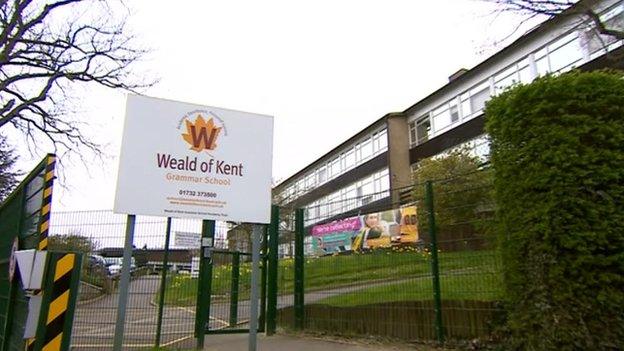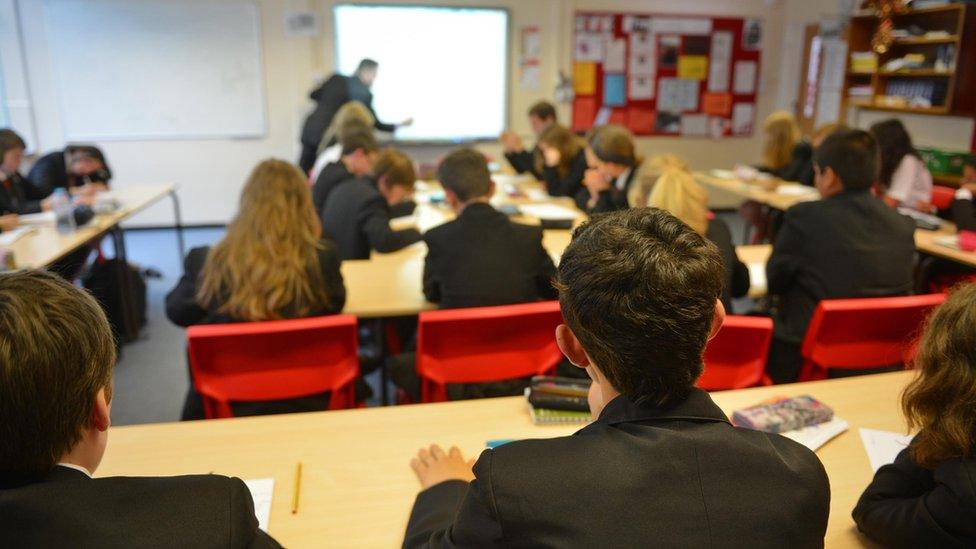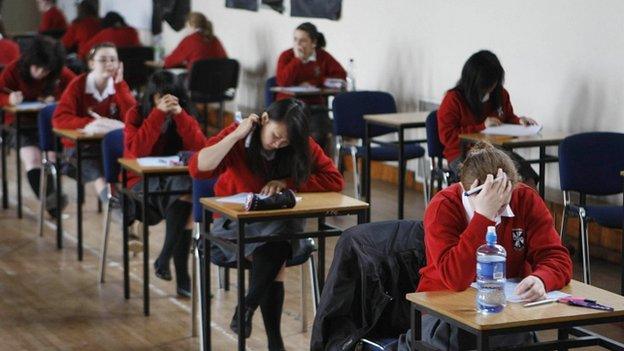Grammar school decision a political risk
- Published

Weald of Kent Grammar School wants to open an annexe in Sevenoaks
Few decisions can have been so long in gestation, so crawled over by civil servants, as the expansion of one Kent grammar school.
A carefully calculated political risk is being taken, to allow an "annexe" in a separate town to go ahead despite the law in place since 1998 preventing any new school based on selection.
It can only unleash calls for more easing of the interpretation of the law to allow similar expansions elsewhere.
Home Secretary Theresa May has already said she would support a grammar school opening an outpost in Maidenhead in her constituency, if there was parental demand.
So there will be accusations this represents a signal that selection is back in business, and as a result legal challenges are likely.
With so much at stake, it's not hard to see why the proposals for the Weald of Kent girls' school to open a second site have been reworked, reframed and resubmitted over several years.
About 5% of state-educated pupils in England go to grammar schools, down from 38% just after the war.
More pupils competing
There are 163 existing grammar schools, with more than 60 in Northern Ireland.
Little might have changed if pupil numbers remained flat, as the political cost of either creating new grammar schools or of trying to remove the system in the parts of England where it remains would be too high.
The problem in Kent, as elsewhere, is that pupil numbers are rising.
So they've argued that either the funnel gets narrower, with more pupils competing for the same number of grammar places, or more capacity needs to be created.
Of course this can be done in more than one way.
A free school with a strong Christian ethos has opened on the same site, right next to the planned Weald of Kent extension. It's in temporary classrooms while a new building is completed.
So this is also about a local political commitment to the existing selective system, with many girls travelling out of Sevenoaks to other grammar schools around the county.
'Half as likely'
Grammar schools, supporters argue, remain popular as an idea.
Polling carried out by ComRes for the National Grammar School Association just before the election found 51% supported allowing new grammar schools to open, with just 10% opposing.
Almost as many, 48%, thought grammars were good for mobility.
Rebecca Allen, director of research think tank Education Datalab, says the evidence shows otherwise.
"A child receiving free school meals is half as likely to get a grammar place as a child who doesn't, even when their ability is the same at the end of primary school as measured in national tests," she says.

There is some debate about the benefits of allowing selective schools
She accepts that children in grammar schools tend to do better.
"If we think of typical child taking eight GCSEs, we think you do one grade better in about four of those GCSEs," she says.
"Now whether you think that's big or not depends on your perspective. For me it's a modestly big impact."
But as she points out, for the majority of children who go to the non-selective schools there is also an effect, which they estimate at dropping about one grade in one of their GCSEs.
Support for grammar schools rests largely on the optimistic belief of many parents that their child will succeed in gaining a place, despite the odds being against them.
The OECD, an increasingly powerful voice in education research, says the most successful systems combine equity with high quality.
Against this background a decision to allow Weald of Kent to open on another site can only be politically high stakes.
It will have a ripple effect, and not just on schools in Sevenoaks.

Grammar school figures
National picture
24.5% of grammar pupils travel from another local authority area each day
21% had attended primary school in another local authority
15% had not attended a state-funded primary school
Kent
7% of grammar pupils travelled from another local authority area each day
7% went to a primary school in another local authority
13% had not attended a state-funded primary school
Source: Education Datalab analysis of Year 11 pupils, 2013/14

This is a decision which respects the local politics of Kent.
But it also risks opening a Pandora's box - a debate about selection for some, or a push for excellence for all.
- Published15 October 2015

- Published2 March 2015

- Published19 May 2015

- Published17 February 2015
